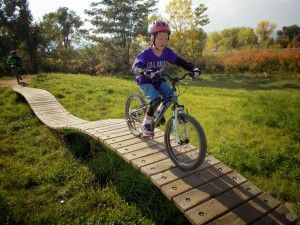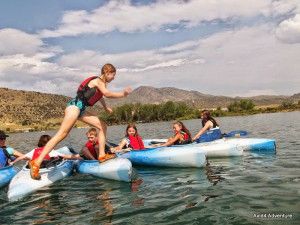Building Confidence through Positive Risk Taking
January 12, 2016 | Amy Diiullo

At Avid4 Adventure, we think teaching kids to take risks is an essential part of helping them grow into self-assured adults. And while we do everything we can to keep them safe, we also empower them to push their limits as they explore the outdoors.
A piece on raising risk-takers in the Chicago Tribune suggests we’re not alone in our thinking: “Parenting experts say that children who are encouraged to take reasonable, safe risks … tend to grow in confidence, are willing to make mistakes and use each failure as an education.” One of these experts, Dr. Deborah Gilboa, a professor, parenting speaker and mother, explains that this kind of risk taking is, “like everything else, something [kids] learn from parents and the experiences we provide them with.”
But how can loving parents turn off urge to overprotect and provide their kids with these kinds of confidence-building experiences? Here are some tried and true strategies:
- Encourage kids choose their level of challenge: Don’t reflexively discourage your kids from taking on a tough new endeavor or force them to try something before they’re ready. Instead, let them take the lead in deciding what to try, providing plenty of support along the way. (Daring kids may need help thinking through their next adventure, while timid ones may need some hand holding.) At camp, we call this “challenge by choice.” It’s about making sure your kids have the skills they need to face the challenge at hand and encouraging them to push their boundaries, but ultimately letting them decide how far to stretch.
- Assess the environment: Before every activity at camp, we do an environmental debrief. If we’re mountain biking, for example, we have kids check for rocks or roots, look for other cyclists, assess the width of the trail and so on. We let kids identify the potential risks in their path so they have a clear picture of what to expect. It’s a powerful skill that’s easy to practice at home. The next time your family is on a hike, have your kids assess what’s ahead. What’s the weather like? Is there any poison ivy on the trail? Steep drop-offs?
- Empower thoughtful decision-making: Avid4 Adventure teaches kids three things to identify when approaching a risk: 1. What’s changed in the environment (maybe their hiking trail gets steeper or muddier), 2. What could happen when encountering that risk (they could slip or twist an ankle) and 3. What can they do to lessen the risk (maybe they’ll suggest adopting a slower pace or looking for handholds)? Whatever the risk, let your kids use their critical-thinking skills to assess it, explore how the situation could play out and decide how to move forward.
- Let them live the consequences: Once they’ve decided how much they want to try, assessed their environment and made a thoughtful decision about what to do, let them do it. If a consequence isn’t life threatening, let them experience it. Certainly, there will be bruises and skinned knees, but they’re a small price to pay in return for your kids learning good judgment in the face of risky situations, gaining the confidence that comes from trying something new and understanding that falling down is just part of life.
- Set a good example: If you want to raise kids who take positive risks, you have to take some yourself. As Dr. Gilboa puts it, “teaching children the skill of reaching and risking happens similarly to most life skills we impart to them—by modeling the behavior, talking about it and giving them lots of opportunities for both success and failure.” If they never see their parents try something new or scary, never see them fall or fail, how will kids have the confidence to take risks themselves?
Raising risk-takers can be scary for parents, but the rewards—more confident, thoughtful, responsible kids—are immeasurable. Just ask the Avid4 Adventure parent whose daughter spent last summer learning to take positive risks under the mentorship of our excellent staff:
“My daughter isn’t the adventurous type, [but the counselors] caringly challenged her to be open to new experiences. Her confidence soared with all the new things she is now able to do.” – Colorado Day Camp Parent
Everything has some element of risk, so how can we support our kids and help them take good risks? We’ve got even more suggestions to help from our post: 6 Things to do to support positive risk-taking in kids.
Don’t forget to register for summer camp today – www.avid-staging.iuuourn3-liquidwebsites.com. Early Bird savings runs from January 9th – February 29th!









